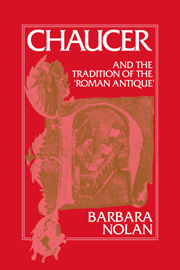Book contents
- Frontmatter
- Contents
- Acknowledgments
- List of abbreviations
- Introduction
- 1 Benoît de Sainte-Maure's Roman de Troie and the compositional practices of the roman antique
- 2 Plaits, debates, and judgments in the Roman de Thèbes, the Roman de Troie and the Roman d'Eneas
- 3 The poetics of fine amor in the French romans antiques
- 4 From history into fiction: Boccaccio's Filostrato and the question of foolish love
- 5 Boccaccio's Teseida and the triumph of Aristotelian virtue
- 6 Saving the poetry: authors, translators, texts, and readers in Chaucer's Book of Troilus and Criseyde
- 7 The consolation of Stoic virtue: Chaucer's Knight's Tale and the tradition of the roman antique
- Epilogue
- Notes
- Bibliography
- Index
Introduction
Published online by Cambridge University Press: 11 September 2009
- Frontmatter
- Contents
- Acknowledgments
- List of abbreviations
- Introduction
- 1 Benoît de Sainte-Maure's Roman de Troie and the compositional practices of the roman antique
- 2 Plaits, debates, and judgments in the Roman de Thèbes, the Roman de Troie and the Roman d'Eneas
- 3 The poetics of fine amor in the French romans antiques
- 4 From history into fiction: Boccaccio's Filostrato and the question of foolish love
- 5 Boccaccio's Teseida and the triumph of Aristotelian virtue
- 6 Saving the poetry: authors, translators, texts, and readers in Chaucer's Book of Troilus and Criseyde
- 7 The consolation of Stoic virtue: Chaucer's Knight's Tale and the tradition of the roman antique
- Epilogue
- Notes
- Bibliography
- Index
Summary
In a charming domestic scene near the beginning of the second book of Chaucer's Troilus and Criseyde, Pandarus discovers his niece, listening, with two other women, to a maiden reading from a book. Pandarus asks Criseyde what she is reading, and she replies with detailed information:
This romance is of Thebes that we rede;
And we han herd how that kyng Layus deyde
Through Edippus his sone, and al that dede;
And here we stynten at thise lettres rede –
How the bisshop, as the book kan telle,
Amphiorax, fil thorugh the ground to helle.
(II. 100–5)As Criseyde describes her “romaunce” of Thebes – including its classical matter, its vernacular language, and its character as a rubricated book – Chaucer is inviting his public to consider the lineaments of a specific, centuries-old form of continental narrative.
For his medieval audience (and for us), the Trojan heroine's reading poses several questions. Why would Criseyde have chosen so specific a book as the Thebes romance? By extension, what might Chaucer's audience, attending to his own Troilus, expect in making an exactly parallel choice? What moral and aesthetic experience might both audiences anticipate from their listening or reading? Even more pointedly, what might it mean for Chaucer's public when Criseyde puts her Thebes-book down? She prefers gossiping and dancing, while they (and we), presumably, continue to read or listen to the Book of Troilus.
- Type
- Chapter
- Information
- Chaucer and the Tradition of the Roman Antique , pp. 1 - 13Publisher: Cambridge University PressPrint publication year: 1992

